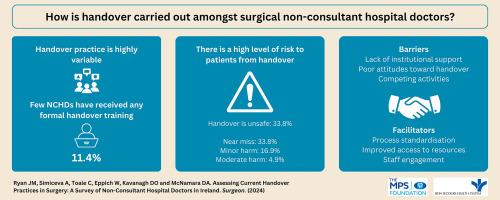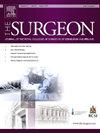Assessing current handover practices in surgery: A survey of non-consultant hospital doctors in Ireland
IF 2.3
4区 医学
Q2 SURGERY
Surgeon-Journal of the Royal Colleges of Surgeons of Edinburgh and Ireland
Pub Date : 2024-05-11
DOI:10.1016/j.surge.2024.04.011
引用次数: 0
Abstract
Background
Handovers of care are potentially hazardous moments in the patient journey and can lead to harm if conducted poorly. Through a national survey of surgical doctors in Ireland, this paper assesses contemporary surgical handover practices and evaluates barriers and facilitators of effective handover.
Methods
After ethical approval and pre-testing with a representative sample, a cross-sectional, online survey was distributed to non-consultant hospital doctors (NCHDs) working in the Republic of Ireland. A mixed-methods approach was used, combining data using triangulation design.
Main findings
A total of 201 responses were received (18.5%). Most participants were senior house officers or senior registrars (49.7% and 37.3%). Most people (85.1%) reported that information received during handover was missing or incorrect at least some of the time. One-third of respondents reported that a near-miss had occurred as a result of handover within the past three months, and handover-related errors resulted in minor (16.9%), moderate (4.9%), or major (1.5%) harm. Only 11.4% had received any formal training. Reported barriers to handover included negative attitudes, a lack of institutional support, and competing clinical activities. Facilitators included process standardisation, improved access to resources, and staff engagement.
Conclusions
Surgical NCHDs working in Irish hospitals reported poor compliance with international best practice for handover and identified potential harms. Process standardisation, appropriate staff training, and the provision of necessary handover-related resources is required at a national level to address this significant patient safety concern.

评估当前外科手术中的交接班做法:对爱尔兰医院非顾问医生的调查。
背景:护理交接是患者治疗过程中潜在的危险时刻,如果操作不当,可能会造成伤害。本文通过对爱尔兰全国外科手术医生的调查,评估了当代外科交接班的做法,并评价了有效交接班的障碍和促进因素:方法:在获得伦理批准并对代表性样本进行预测试后,我们向在爱尔兰共和国工作的非顾问医院医生(NCHDs)发放了一份横断面在线调查问卷。调查采用混合方法,通过三角测量设计将数据结合起来:共收到 201 份回复(18.5%)。大多数参与者是高级内科医师或高级注册医师(49.7% 和 37.3%)。大多数人(85.1%)表示在交接过程中至少在某些时候收到的信息是缺失或不正确的。三分之一的受访者表示在过去三个月内曾因交接而险些发生意外,与交接相关的错误导致了轻微(16.9%)、中度(4.9%)或严重(1.5%)的伤害。只有 11.4% 的人接受过正规培训。据报告,阻碍交接工作的因素包括消极态度、缺乏机构支持以及相互竞争的临床活动。促进因素包括流程标准化、改善资源获取途径以及员工参与:在爱尔兰医院工作的外科非传染性疾病防治人员报告称,他们对国际最佳交接实践的遵守情况较差,并发现了潜在的危害。需要在全国范围内实现流程标准化、对员工进行适当培训并提供必要的交接班相关资源,以解决这一重大的患者安全问题。
本文章由计算机程序翻译,如有差异,请以英文原文为准。
求助全文
约1分钟内获得全文
求助全文
来源期刊
CiteScore
4.40
自引率
0.00%
发文量
158
审稿时长
6-12 weeks
期刊介绍:
Since its establishment in 2003, The Surgeon has established itself as one of the leading multidisciplinary surgical titles, both in print and online. The Surgeon is published for the worldwide surgical and dental communities. The goal of the Journal is to achieve wider national and international recognition, through a commitment to excellence in original research. In addition, both Colleges see the Journal as an important educational service, and consequently there is a particular focus on post-graduate development. Much of our educational role will continue to be achieved through publishing expanded review articles by leaders in their field.
Articles in related areas to surgery and dentistry, such as healthcare management and education, are also welcomed. We aim to educate, entertain, give insight into new surgical techniques and technology, and provide a forum for debate and discussion.

 求助内容:
求助内容: 应助结果提醒方式:
应助结果提醒方式:


